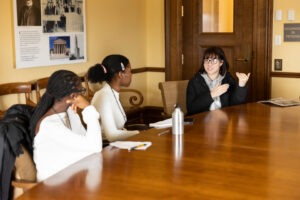
ThreeSixty students Wonser Mongrue and Gloria Ngwa sat down with Rep. Tina Liebling (DFL, Rochester) and Unidos MN to discuss how Minnesota has opened health care access to all, including undocumented people.
For Unidos MN, the focus is on how the state will allocate money for programs to make health care accessible for undocumented Minnesotans. The group worked with lawmakers for the right for undocumented people to access MinnesotaCare, the state’s health insurance for low-income families. Keep in mind, undocumented citizens cannot vote or bring this bill to the legal floor, but advocate groups like Unidos MN makes it possible to represent the voices of the marginalized and to lobby for social justice.
We sat down with Unidos MN advocates Jennifer Emigdio, a college student at the University of Minnesota, Isabella Cook, a youth program organizer, and Rebeca Morales, a fellow member. They highlighted the impact this bill will have on undocumented people, particularly teens and young adults in this demographic.
ThreeSixty also talked to Rep. Tina Liebling about health care legislation.
This interview was edited for length and clarity.
It’s been recorded that more than 40,000 undocumented Minnesotans meet the MinnesotaCare program requirements. Before this program, how were people seeking healthcare attention before? What were challenges faced?
Emigdio: I know from my own experience that my parents weren’t able to apply or even afford health care. We wouldn’t even go to the hospital if anything was wrong, and we would just have to find home remedies or find ways to push through with any ailments. I’m sure that many other undocumented people in Minnesota have done the same – just not seeking care and having to live with pains or disabilities that they get no health care for.
Cook: Then you think about our older folks, you know, who have heart conditions or asthma, whatever it is. All of these people are unable to get access to anything. Who is going and telling these people in their own language or explaining this bringing this information to the community so they know what’s going on? Because there may be there are services in place but if no one is telling you, right?
Morales: Here, people who can’t afford to go to a normal hospital, they go to those “doctors.” … The ones who doesn’t have like a title. Because they say, “Oh, yeah, just pay me like $20, $50, and I can just help you.” They actually can lead to a big problem.
Are we a state you’d consider is moving in the right direction for accessible healthcare?
Emigdio: I think we are moving forward to a more accessible and affordable trajectory with health care. It might not be directly the government that’s fully in action of that, and it’s more the people who are experiencing these difficulties. I know that the people working together are able to push Minnesota forward and are making it a more hospitable place for people who are generally disenfranchised.
Cook: A lot of working-class people who make up 50% of the population or more are struggling with the same exact issues; and they are citizens, they’re residents; they have status. This is something that’s going to help all people, and I just hope other states around us or around the nation will look toward Minnesota, as an example state. Maybe one day we’ll have federal health care to be a dream.
How can young people, such as teens, and communities support Unidos MN efforts?
Emigdio: Unidos has multiple events that are held at the Capitol where we would demand our representation and speak with our representatives about what we are fighting for, and the acts or plans that we want to pass for our communities.
Cook: I think just getting the story out there and inviting more people in the communities to come to events and meals is hosting or come to other events that these nonprofits are hosting because the intention is we want we want to help each other. If we don’t know what’s going on, we’re not educated, not just through school, but educated on these issues that are happening, how are we ever going to help ourselves?
Morales: To spread the voice.
Gloria worked with Sahan Journal Reporter Alfonzo Galvan and MPR Producer Ngoc Bui to finish her story. This story was completed at ThreeSixty’s Winter News Team: Capitol Edition in February 2024, where high school journalists covered important legislative issues, impacting Minnesota youth. Read more stories here.
